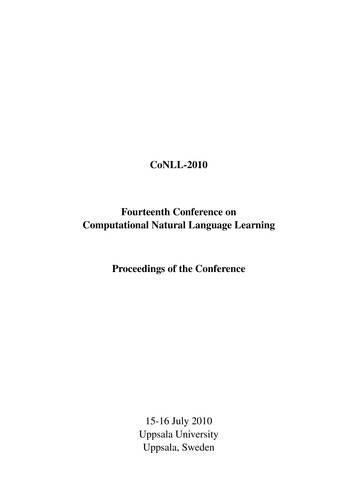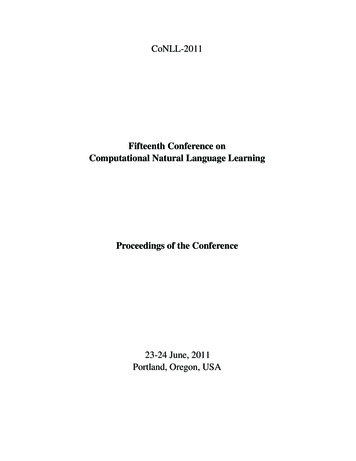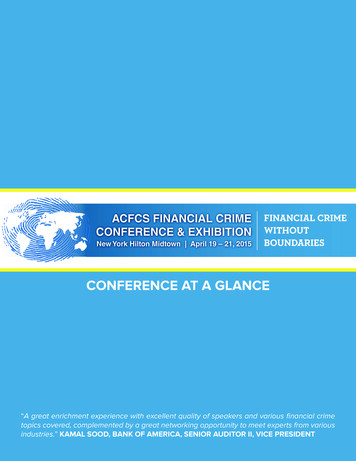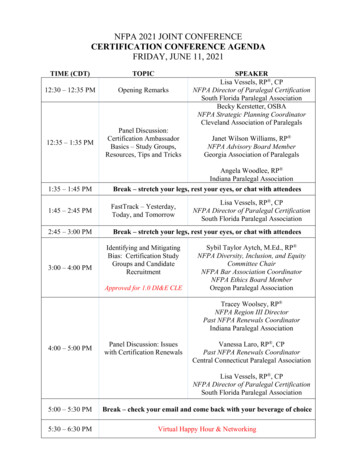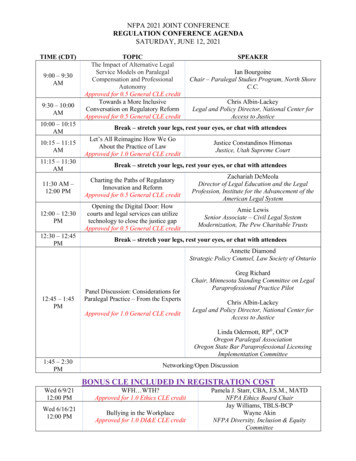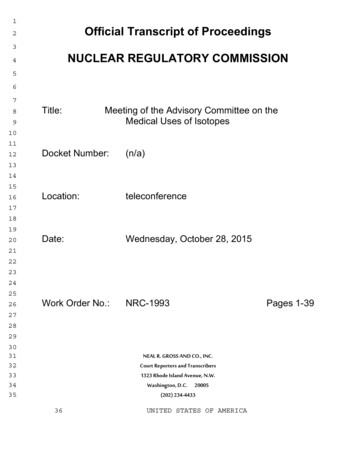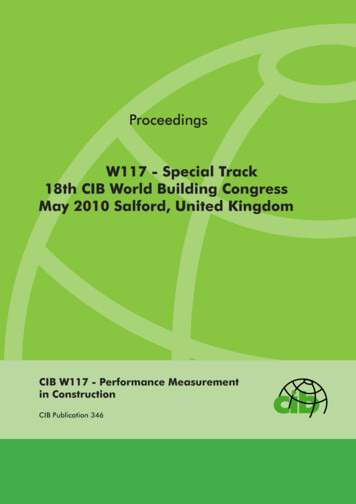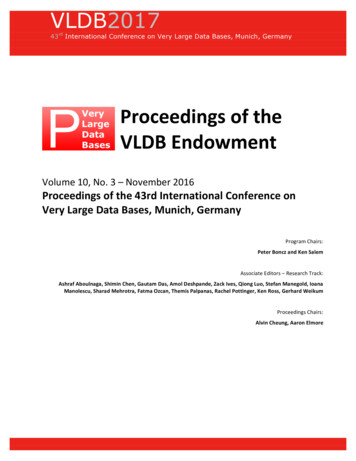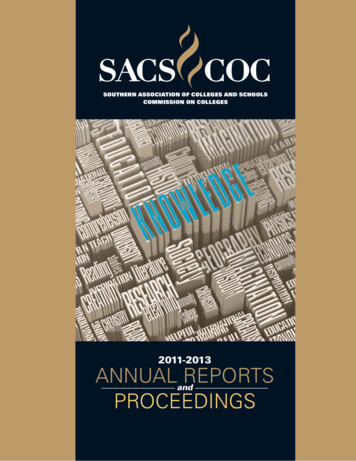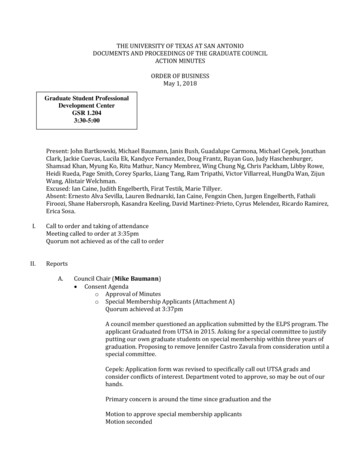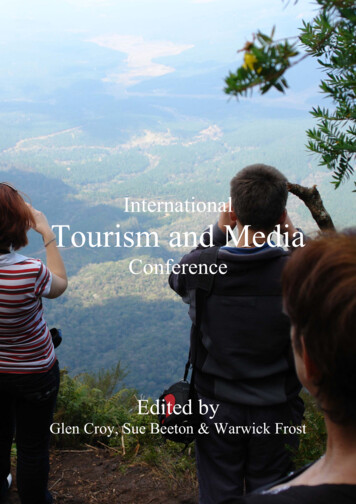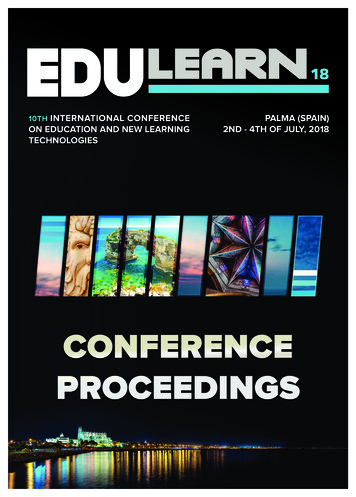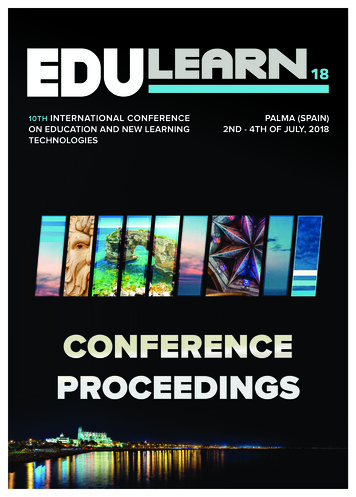
Transcription
CONFERENCEPROCEEDINGS
Published byIATED Academyiated.orgEDULEARN18 Proceedings10th International Conference on Education and New Learning TechnologiesJuly 2nd-4th, 2018 — Palma, SpainEdited byL. Gómez Chova, A. López Martínez, I. Candel TorresIATED AcademyISBN: 978-84-09-02709-5ISSN: 2340-1117Depósito Legal: V-1578-2018Book cover designed byJ.L. BernatAll rights reserved. Copyright 2018, IATEDThe papers published in these proceedings reflect the views only of the authors. Thepublisher cannot be held responsible for the validity or use of the information thereincontained.ii
EDULEARN1810th International Conference on Education and New Learning TechnologiesEDULEARN18 COMMITTEE AND ADVISORY BOARDAgnes KrizAgustín LópezAleksandra Kulpa-PuczynskaAline Grunewald NicheleAmparo GirósAna Mouta CostaAna TomásAnita HabókAnn ConwayAntonio GarcíaAUSTRIA Ignacio BallesterSPAIN Ignacio CandelPOLAND Ingolf WaßmannSPAIN Ivana Ogrizek BiskupicHUNGARY Janet HerrelkoBéatrice ArendBerhannudin Mohd SallehCelia MacDonnellCharles ElkabasChelo GonzálezChris SchabenChristian BourretCole WebberCristiano LuchettiCristina Sayuri DusiGERMANYSPAIN Patricia ReynoldsFRANCE Patsy Robles-GoodwinSPAIN Peter HaberMALAYSIA Jose Luis BernatSPAIN Petr SudickyUNITED STATES Josephine DesouzaUNITED STATES Piedade Vaz-RebeloCANADA Josephine MunthaliSPAIN Judith SzerdahelyiU. KINGDOM Piotr BerkowskiUNITED STATES Rafael Fernández-FloresUNITED STATES Kalaimagal RamakrishnanFRANCE Kari BjörnMALAYSIA Rahimah EmbongFINLAND Rita KumarCANADA Kateřina VitáskováCZECH REP. Roma KriaučiūnienėU.A.E. Kristin BroganIRELAND Rosa KarnitaBRAZIL Laura BordiUNITED STATESCROATIA Norbert EnglischSPAIN Paolo SomigliLUXEMBOURG Jose F. CabezaSLOVAKIAUNITED STATESAUSTRALIA Olyesya RazdorskayaSPAIN Javier DomenechITALYSPAIN Minerva CorderoUNITED STATES Norma BarrachinaIRELAND Janine DelahuntyNORWAY Joanna LeesCANADAU. KINGDOM Michela BaraldiPORTUGAL Iván MartínezBeata GodejordSPAIN Martin MaltaisRUSSIAN FED. Michal PalkoSPAIN Isabel HuetIRELAND Javier MartíLATVIAGERMANY Michael CroninBRAZIL Irina KhoutyzAshling Ryan-ManganSPAIN Marta DzilumaFINLAND Sabina MaraffiSPAINRUSSIAN FED.ITALYUNITED STATESUNITED STATESAUSTRIACZECH REP.PORTUGALPOLANDMEXICOMALAYSIAUNITED STATESLITHUANIAU. KINGDOMITALYDaniel BoulosUNITED STATES Lorena LópezSPAIN Sergio PérezSPAINDavi De ContiBRAZIL Luís DescalçoPORTUGAL Shaun SpeedU. KINGDOMDavid DaltonU.A.E. Luis Gómez ChovaDavid MartíSPAIN Lynn BoyleDespina Varnava MarouchouDouglas BaleshtaDragos TataruEladio DuqueEmine KuluşaklıFilip DevosFritz VandoverGarold ZborovskyGemma van Vuuren CassarHen FrimanSPAIN Shujaat WastyU. KINGDOM Svein Thore HagenCYPRUS Mª Jesús SuestaSPAIN Tetyana AntimirovaCANADA Margaret MackayROMANIA Marge TäksSPAIN M de Nazaré Souza RibeiroTURKEY Maria PorcelRUSSIAN FED. Maria-Iuliana DascaluCANADAGERMANYESTONIA Tiziano TelleschiITALYBRAZIL Tolga AkbulutUNITED STATES Victor FesterUNITED STATES Maria Schwarz-WoelzlNORWAYU. KINGDOM Thomas RachfallSPAIN Tomas KalaBELGIUM Maria ReGesterCANADAAUSTRIA Vidar GynnildROMANIA Vincenza BenignoTURKEYCZECH REP.NEW ZEALANDNORWAYITALYU. KINGDOM Mario De TullioITALY Wendy GortonUNITED STATESISRAEL Mark WilkinsonSINGAPORE Xavier LefrancFRANCEiii
EDULEARN1810th International Conference on Education and New Learning TechnologiesCONFERENCE SESSIONSORAL SESSIONS, 2nd July 2018Immersive Learning & Virtual RealityPeer Learning and Teaching21st Century Skills (1)Students' Wellness and WellbeingQuality and Excellence in Teacher TrainingEnglish as a Foreign Language (1)Mobile LearningICT in EducationActive Learning (1)Virtual Reality in EducationFlipped LearningWorkplace Learning (1)Joint and Dual DegreesTeacher Training ExperiencesProfessional Development of Foreign Language TeachersProgramming and Coding Skills (1)Technology Enhanced Learning (1)Active and Game-Based LearningAugmented Reality in EducationLearning by Doing & Experiential LearningWorkplace Learning (2)University-Industry CollaborationICT Skills among Teachers (1)Health Education TechnologiesProgramming and Coding Skills (2)Educational Games DesignActive Learning (2)Social Media and Social Networks in EducationProject, Problem and Inquiry-Based LearningEntrepreneurship EducationInternational Collaboration ExperiencesICT Skills among Teachers (2)Engineering EducationLearning Space DesignDigital Skills & Media LiteracyDropout Prevention & Students' MotivationPOSTER SESSIONS, 2nd July 2018Emerging Technologies in EducationPedagogical Innovations and New Educational Trendsiv
EDULEARN1810th International Conference on Education and New Learning TechnologiesORAL SESSIONS, 3rd July 2018e-Learning Experiences (1)Videos for LearningSpecial Education (1)Language Learning EducationCultural Diversity & Inclusion (1)Curriculum Design in EngineeringLearning Analytics (1)Tutoring & MentoringWriting Skills and PerformanceLearning Management Systems (LMS)Serious GamesSpecial Education (2)Technology Enhanced Learning (2)Pre-Service Teacher EducationLanguage Learning: from ESP to EMILearning Analytics (2)e-AssessmentQuality Assurance and Accreditation in Higher EducationPersonalized LearningBlended LearningTeacher Training in Special EducationSTEM Education (1)Professional Development of TeachersLanguage Learning TechnologiesInformal LearningNew technologies in AssessmentLeadership and Management in EducationMassive Open Online Courses (MOOC)Flipped ClassroomSpecial Needs and Inclusive EducationMaths and Statistics in Higher EducationCreativity in EducationEnglish as a Foreign Language (2)Gamification & Game-Based LearningAssessment of Student Learning (1)Management in Higher Educatione-Learning Experiences (2)Effective Teaching PracticesCultural Diversity & Inclusion (2)STEM Education (2)Soft Skills DevelopmentBusiness and Accounting Education21st Century Skills (2)Assessment of Student Learning (2)Sustainability EducationPOSTER SESSIONS, 3rd July 2018Experiences in EducationGlobal Issues in Education and Researchv
EDULEARN1810th International Conference on Education and New Learning TechnologiesVIRTUAL SESSIONS21st Century SkillsAcademic Research ProjectsAugmented RealityBarriers to LearningBlended LearningCollaboration Projects and NetworksComputer Supported CollaborationCurriculum Design and DevelopmentDesign Thinking and CreativityDiversity Issues, Women and MinoritiesE-content Management and Developmente-Learning Projects and ExperiencesEarly Childhood and Preschool EducationEducating the EducatorsEducation and GlobalizationEducational ManagementEducational Software & Serious GamesEducational Trends and Best Practice ContributionsEmerging Technologies in EducationEnhancing Learning and the Undergraduate ExperienceEntrepreneurship CurriculumEthical Issues in EducationEvaluation and AssessmentEvaluation and Assessment of Student LearningExperiences in ResearchFlipped LearningGame Based LearningHigher and Further EducationHigher Education Area: The Bologna Declaration and ECTS ExperiencesImpact of Education on DevelopmentInformal learningLanguage Learning InnovationsLeadership in EducationLearning and Teaching MethodologiesLearning by doing & Experiential LearningLearning Management Systems (LMS)Lifelong LearningLinks between Education and ResearchMassive Open Online Courses (MOOCs)Mobile and Tablet TechnologiesMobile LearningMulticultural EducationNeuroscience in EducationNew Learning/Teaching ModelsOnline/Virtual LaboratoriesOrganizational, Legal, Policy and Financial IssuesPre-service and In-service Teacher ExperiencesPrimary and Secondary EducationProblem and Project-Based LearningProfessional Development of TeachersQuality Assurance and AccreditationSocial & Digital Media in EducationSpecial Education & Inclusive LearningSTEM in EducationStudent Support in EducationTeam-Based and Collaborative LearningTechnology-Enhanced LearningThe Impact of Web Technologies on EducationTraining Educational StaffTransferring Skills and DisciplinesUniversity-Industry CooperationVirtual Learning Environments (VLEs)Virtual Reality and 3D ApplicationsVocational TrainingWeb 2.0 and Social NetworkingWorkplace Training and Employability Issuesvi
EDULEARN1810th International Conference on Education and New Learning TechnologiesSTUDENTS' SATISFACTION WITH E-LEARNING EXAMPLE OF ESTONIAN AVIATIONACADEMYS. Vanker, A. Roio, L. Nuut, J. Jakimenko6733EDUCATION OF ALARM RECEIVING CENTRE DISPATCHERS IN THE FIELD OFVIDEO MANAGEMENT SYSTEMSM. Boroš, A. Veľas, M. Kutaj, T. Loveček6738TRANSVERSAL COMPETENCES IN NUCLEAR ENGINEERING STUDIES: IMPROVINGTHE COORDINATIONS. Gallardo, J.F. Villanueva, S. Carlos, J. Ordoñez6743STUDY OF THE VALIDITY OF NEW ASSESSMENT METHODOLOGY BASED ON ICT’SI.C. Fita, J.M. Cruz, I. Buisán6751REDESIGNED, COLLABORATIVE LEARNING ENVIRONMENTS – STAFF USE ANDPERCEPTIONSB. Swinnerton6757GAMIFICATION EXPERIENCES IN A TECHNICAL COURSES. Gallardo, J.F. Villanueva, B. Juste, M. Lorduy6764DIGITAL INFOGRAPHICS ON MARINE LITTER: SOCIAL REPRESENTATIONS ANDSCIENCE COMMUNICATIONA. Teixeira, C. Morais, L. Moreira6772LEARNING MEDIA-ETHICS ONLINE OPPORTUNITIES AND CHALLENGES OF A NETLIKE COURSE-STRUCTURES. Endres6782WHAT TO LEARN NEXT: INCORPORATING STUDENT, TEACHER AND DOMAINPREFERENCES FOR A COMPARATIVE EDUCATIONAL RECOMMENDER SYSTEMH. Abu Rasheed, C. Weber, S. Harrison, J. Zenkert, M. Fathi6790ICT IN BULGARIAN SCHOOLS – CHANGES IN THE LAST DECADEV. Terzieva, E. Paunova-Hubenova, S. Dimitrov, N. Dobrinkova6801DESIGNING THE NEXT GENERATION OF CLASSROOMS: A NEW MODEL FORCOLLABORATION TO FACILITATE THE DESIGN OF 21ST CENTURY LEARNINGENVIRONMENTSV. Jani, P. Sharma6811IMPROVING ACTIVITIES TO DEVELOP SOFT SKILLS USING FLIPPED TEACHING INHIGHER EDUCATIONI.C. Fita, J.F. Monserrat, G. Moltó, A. Fita6820FLIPPED CLASSROOM & EXPLAINER VIDEOS IN AN ENGLISH SELF-LEARNINGSETTING: EMPIRICAL DESIGN, FEATURES AND APPLICATIONJ. Ullmann6826VIRTUAL REALITY AIDED TRAINING FOR IMPROVING HAZARD RECOGNITIONSKILL: A PILOT STUDYM. Dado, R. Hnilica, V. Messingerová6828SELF-DIRECTED LEARNING READINESS OF ARCHITECTURE STUDENTS INCOVENANT UNIVERSITYO. Alagbe, O. Obi, C. Obi, A. Akinwande, O. Agbeyo6832INTRODUCING SECONDARY SCHOOL STUDENTS INTO FOOD SCIENCE ANDTECHNOLOGY RESEARCHI. Gómez, M. Ortega-Heras, M.D. Rivero-Pérez, M. Cavia-Saiz, P. Muñiz, M.L. González-Sanjosé6839THE NEW MODEL OF EDUCATION OF UNIVERSITY STUDENTS IN THE FIELD OFFIRE AND RESCUE SERVICESA. Fanfarová6845WHAT GAME-BASED LEARNING AND LEARNER-CENTERED TEACHING CANLEARN FROM EACH OTHERJ. Fishburn6853DIGITAL TEACHING MATERIALS: FEEDBACK FROM CZECH PRE-SERVICETEACHERSM. Bilanova, K. Kostolányová6859APPLYING VIRTUAL REALITY TO FORESTRY MACHINERY SAFETY EDUCATIONM. Dado, R. Hnilica, V. Messingerová6866ACTIVE METHODOLOGY IN MECHANICAL TECHNOLOGYJ.E. Ribeiro, P. Barros, F. Silva6870lvii
ACTIVE METHODOLOGY IN MECHANICAL TECHNOLOGYJoão E. Ribeiro1,2, Paula M. Barros1, Flora C. Silva1,31School of Technology and Management, Polytechnic Institute of Bragança (PORTUGAL)2CIMO (PORTUGAL)3FibEnTech (PORTUGAL)AbstractChallenged with the existence of increasingly heterogeneous classes in higher education, it isimperative that the teacher reflects on his practice and worries about the learning environment of thecurricular units that he/she teaches. This paper describes a teaching experience developed in theMechanical Technology II course unit, of the degree in Mechanical Engineering, in the 2016/2017 and2017/2018 academic years. The main objective of the experiment was to achieve a greaterinvolvement of students in the theoretical component of the course unit. Thus, the students wereassigned the responsibility of presenting the theoretical subjects in the classes instead of beingpresented by the teacher as was usual in other years. In addition, in each class, a debate was held onthe presentations and the students made a brief written evaluation of the subject. Evaluating theexperience, through a questionnaire, the students generally agreed that it was positive for theirlearning. This is corroborated by the results of the evaluation, since, compared to previous years,there was a significant improvement in the students' classifications in the theoretical component of thecourse unit.Keywords: Mechanical technology, presentation of themes, bibliographic research, active participation.1INTRODUCTIONGiving students the role of protagonists in the process of teaching-learning and promoting theirautonomy with the planned monitoring of teachers was the central focus of the academic policies anddiscourses that underpinned the implementation of the Bologna process in European higher education[1]. However, this change of paradigm cannot be only by decree, but has to be a project felt by theteachers involved. It should be remembered that in higher education, teaching is often understood asa way of transmitting knowledge, being the lecture classes, in which students are mere receivers ofinformation, the most commonly used method ([2], [3]).Thus, to have a real shift from lecture teaching to methodologies which consider the student as aconstructor of their own knowledge, it is important that teachers reflect on their practices and launchthemselves into the challenge of trying new teaching approaches to be a powerful helper in thisprocess.Some teaching methodology like the Project-Based Learning [4] and the method of Flipped Classroom[5], already experienced by some teachers in higher education ([6], [7], [8], [9], [10]), meet theobjective of giving students a more active role in their learning process. The first method is based onthe development of a project (goal) in which the knowledge to develop it is acquired by the students,with the support of the teacher, as they need it [11]. In the Flipped Classroom, students use the nonclassroom timetable to watch "virtual lectures" available on the internet, or provided by the teacher[12], thus freeing the classroom time to occupy students with other activities. As refer Talbert [9] “toput students in a better position to succeed, it would seem that the contexts of the traditionalclassroom need to be reversed: information transfer should be done outside of class using media thatgive students more control, and high-level tasks should be done inside of class where the instructor ispresent to guide students in efficient and effective work” (p. 362).In this way, the teacher leaves the role of "sage on stage" [13], in which the main function is to provideinformation to the class and instead he can use the time available to guide students in solving tasksthat promote interest, without the pressure with the end of the program of the course unit.The degree course in Mechanical Engineering of the Higher School of Technology and Managementof the Polytechnic Institute of Bragança integrates in its study plan the course unit of MechanicalTechnology II, which works in the 1st semester of the 3rd year. The programmatic contents areProceedings of EDULEARN18 Conference2nd-4th July 2018, Palma, Mallorca, Spain6870ISBN: 978-84-09-02709-5
organized into fifteen major themes that can be grouped according to two classifications:manufacturing processes and metal joining processes (welding and structural adhesives).The curricular classes are divided into theoretical and practical, each lasting two hours per week. Intheoretical classes the usual methodology is the lecture of contents by the teacher. The practicalclasses, usually more participate by the students, having experimental and laboratory components, inwhich are designed and manufactured metal parts.Considering that the approval rate for the course unit is usually over 75%, it could be concluded thatstudents perform well in the course unit. However, if the theoretical component was separated fromthe practical component, it is observed that in the first component the students have much lowerclassification, for example, the percentage of positive classifications in the theoretical part ranged from19% to 42% in the three academic years before 2016/2017. In this context, there is a need to rethinkalternative approaches to theoretical classes that, in addition to motivating students, contribute to amore effective learning of the contents inherent to this component. With this in mind, the teacher of thecourse unit (one of the authors of this article) decided, in the 2016/2017 and 2017/2018 academicyears, to adopt a teaching methodology in the theoretical classes, partially following some of the ideasinvolved in the Flipped Classroom methodology.2METHODOLOGYThe experiment carried out had a target group of 15 students and another with 50 students, who wereattending the course of Mechanical Technology II in the academic years 2016/2017 and 2017/2018,respectively. Both classes consisted mainly of male students. In addition to Portuguese students,classes also included international students of Spanish and Brazilian nationality, and thisheterogeneity was most evident in the 2017/2018 school year. That is, in 2016/2017, the classconsisted of 4 Spanish students and 11 Portuguese students and in 2017/2018 by 14 Brazilian, 10Spanish and 26 Portuguese.During these academic years, in the theoretical classes of the course unit, the content was carried outby the students rather than by the teacher. In this way, each student (in 2016/2017), or group of twostudents (in 2017/2018), was responsible for presenting a theoretical theme. In this sense, wasproposed to students a search about the subjects, using specialized bibliography or the internet(websites, videos, etc.). Subsequently, on a previously agreed date, they would make the presentationto their colleagues. At the end of this presentation there was a large group debate in the classroomwhere the other students of class could request clarifications about the theme content to the colleaguewho presented the topic, furthermore was discussed the application of theoretical contents to practicalcases. Since all the students also had as a task the previous reading of the topic to be presented, theirparticipation in this discussion could be more active. In order to encourage the students' involvementin the debate and the previous study of contents, at the end of each class, a "classroom question" wasalso proposed. This was organized differently in the two school years, due to the high number ofstudents in the class of the second academic year in which the experience was implemented. Thus, in2016/2017, the "lesson question" consisted of a written test of one or two development questionsabout the topic presented. On the other hand, in 2017/2018, was implemented an online test whereten multiple-choice questions were randomly generated for each student, based on a set of 20questions made by the teacher.Taking into account the work developed, the evaluation of the students to the course unit was madeusing three different components: Presentation of the theoretical part by the students: 10%. Written evaluation (weighted average of the classification of classroom questions): 60%. Technical report and practical performance in laboratory: 30%.At the end of the experiment, the students answered a questionnaire whose main purpose was togather their opinion about the contribution of the methodology applied to their learning, as well as,their opinions about the changes to be implemented in future years. It was not possible to have allstudents who participated in the experiment respond to the questionnaire, so the number of responseswas 12 and 36 students, in the 2016/2017 and 2017/2018 school years, respectively. Thus, the dataobtained through the questionnaire, the lecture notes collected by the teacher as a participantobserver, his own reflection on the classes, and the students' performance in the classroom questionswere used to analyze the impact of the approach methodology described in the two years at the same6871
time and to investigate how the significant increase in the number of students in the class influencesthe process.3RESULTSAlm
Fritz Vandover UNITED STATES Maria Schwarz-Woelzl AUSTRIA Vidar Gynnild NORWAY Garold Zborovsky RUSSIAN FED. Maria-Iuliana Dascalu ROMANIA Vincenza Benigno ITALY . Early Childhood and Preschool Education Educating the Educators Education and Globalization Educat
